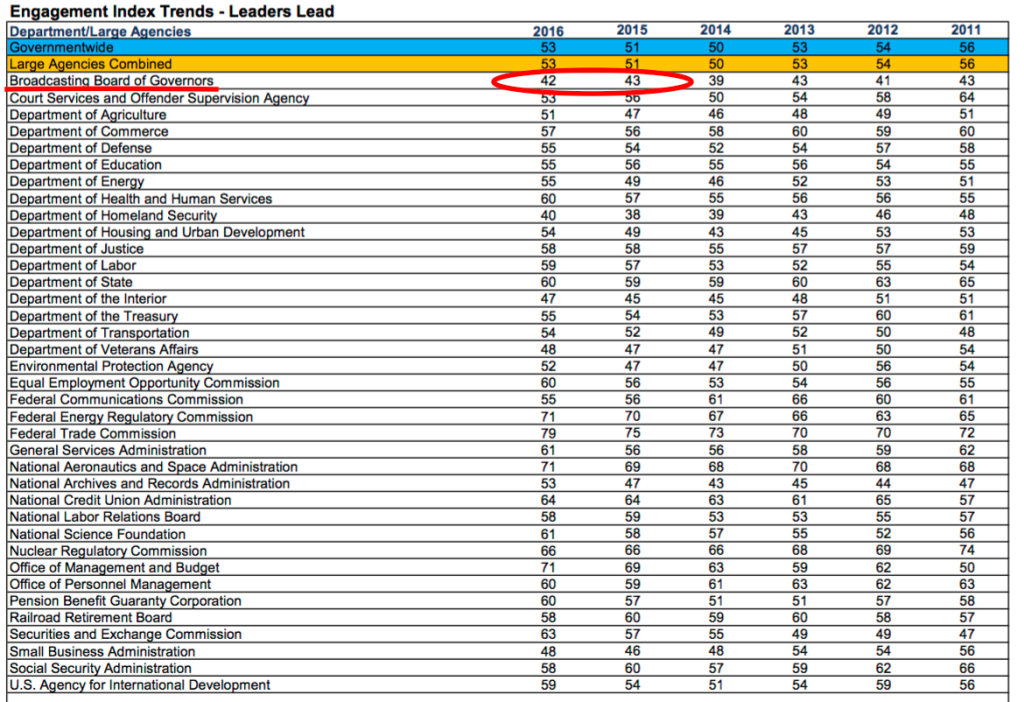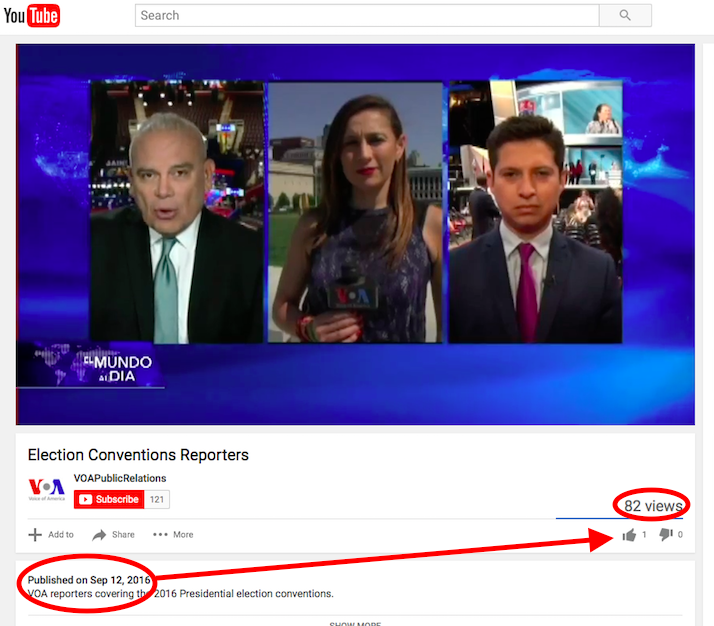Commentary
‘Regular Bottom Feeder Going Backward’ Under New CEO
Broadcasting Board of Governors Information War: Long Lost The Great Disappearing Act of the 21st Century
By The Federalist
In a memo titled “Year in Review & Looking Forward (September 14, 2016), John Lansing, the chief executive officer (CEO) of the Broadcasting Board of Governors (BBG), makes a number of self-serving claims. By Mr. Lansing’s own admission in his memo, he is “impressed by the dedicated group of people who work here in the Cohen Building.” Presumably, these BBG employees can’t be too naive or incapable of making sound judgments about their new leader. Many of them are in fact excellent journalists trained to see through puffery and disinformation.
As reported by Washington Post columnist Joe Davidson, in the latest Federal Employee Viewpoint Survey (FEVS) conducted by the Office of Personnel Management (OPM) between April and June of 2016, these employees appear to have a particularly dim view of Mr. Lansing’s leadership abilities.
Perhaps Mr. Lansing did not know about the government-wide survey results when he wrote his memo on September 14. Joe Davidson’s column is dated September 20.
Either Mr. Lansing is terribly mistaken, or the employees that have impressed him so much during his one year tenure at the agency are completely wrong about him, his experience and his leadership skills in a U.S. government setting.
Joe Davidson wrote in his Washington Post column: “The Broadcasting Board of Governors, another regular bottom-feeder that oversees the Voice of America and other government broadcasters, also scored 56 [in Employee Engagement]. But unlike DHS, BBG is going backward. It scored two points better last year [in Engagement Index Trends].”

DHS and many other agencies at the bottom of the FEVS ratings at least made some made progress in 2016. BBG went backward in both employee engagement and top leadership assessments.
“Bottom-feeder” and “going backward,” that about sums it up.
After watching John Lansing for several months, BBG employees gave the agency another record-low rating in “Engagement Index Trends – Leaders Lead” category, a decrease of one point from the time before his arrival at the agency.
From the low of 43 in 2015 to 42 in 2016.
BBG employees were not impressed or persuaded by Mr. Lansing’s statements, speeches, promises, or even his Employee Morale Commitment Letter, which even BBG Watch reposted in full with a positive commentary prior to the time when most of the employee filled out their satisfaction surveys. It appears that these BBG employees had a chance to observe Mr. Lansing more closely than some of the prematurely optimistic BBG Watch commentators who had not yet met him in person.
“Bottom-feeder” and “going backward,” that about says it all after one year on the job.
As an acquaintance quipped about Mr. Lansing’s September 14 memo, “It sounds like Lansing is getting a head start on working up his resume.”
In the memo, Mr. Lansing notes that he has been on the job for a year. He makes the claim that the agency has achieved “strong audience growth” and a “push for industry-leading ways to achieve impact in our programming…”
The claims are bold, but reality doesn’t support Lansing’s ebullient optimism.
Lansing’s first claim of progress is the formation of an “U.S. international media Coordinating Committee (ICC) for “strategic coordination.” This reminds us of a remark by a current BBG board member about the agency’s so-called “strategic plan,” as being “neither strategic nor a plan.” This appears to track in the same vein, the agency’s penchant for the formation of committees to study the agency to death. We call it “paralysis by analysis.”
But also insinuated into these committees is a cover. That cover is to preserve the status quo. When people sitting on these committees are representative of the failed and corrupted management structure, you know the agency is going nowhere.
The question will always be: has anything changed? The answer: just about nothing. The agency continues to be its own monument to:
- “Dysfunctional” (Heritage Foundation scholar Helle C. Dale)
- “Practically Defunct” (Hillary Clinton)
- “Broken” (US statesmen, diplomats, media experts and journalists interviewed by former BBG member S. Enders Wimbush and former Radio Free Europe / Radio Liberty executive Elizabeth M. Portale)
- “Truly Rudderless” or Leaderless (Chairman of the House Foreign Affairs Committee, Rep. Ed Royce)
The end result still is:
- “This Broken Agency is Losing the Info War to ISIS & Putin,” House Committee on Foreign Affairs Blog, February 23, 2016.
These are the cornerstones of how this agency operates.
Lansing’s memo talks about “Putting Our Audiences First – On Their Terms.”
That may have been the right strategy shaping programming to some of America-friendly audiences during the Cold War, but it is not a particularly wise or particularly sophisticated strategy for the Muslim World, Russia, and China in the post-Cold War digital propaganda age when America’s adversaries are easily outmaneuvering the “practically defunct” U.S. agency and brainwashing countless individuals and groups.
Among other things, Lansing cites the Middle East Broadcasting Network’s (MBN) “Raise Your Voice” initiative in the Middle East and the launch of the joint Voice of America and Radio Free Europe / Radio Liberty “Global Town Hall” in Somalia and Minnesota as a counter to ISIS recruitment.
Perhaps individual BBG entities if they were freed from the central BBG bureaucracy could be effective in their own regions if allowed to customize their programs under the right kind of experienced and sophisticated leadership. But we must ask where is Mr. Lansing’s prior experience in overseeing reporting on ethnic and religious groups in the United States or abroad?
Where is his prior experience in any kind of U.S. government operations?
Where is his substantive experience in intercultural communications, or any prior professional contact with U.S. foreign policy or public diplomacy?
Being a successful manager of the U.S. Food Network does not necessarily make Mr. Lansing another Edward R. Murrow or John Chancellor — two vastly experienced international and domestic journalists who were in charge of the United States Information Agency (USIA) and the Voice of America respectively during the Kennedy and Johnson administrations.
According to Mr. Lansing official BBG bio:
“As President of Scripps Networks, Lansing was responsible for strategic and operational oversight of the $2.5 billion division of Scripps Networks Interactive, including the company’s portfolio of six cable networks – Food Network, HGTV, Travel Channel, DIY, Cooking Channel and Great American Country [Emphasis added.] – and the $100 million Scripps Networks Digital division.”
If Mr. Lansing or Voice of America director Amanda Bennett had extensive experience in intercultural communications, foreign policy, managing large multi-ethnic political news organizations, or working in key managerial and/or broadcasting positions at major U.S. news networks, at least one of them would have certainly noticed something very strange in how VOA chose to report on the horrific recent terrorist stabbing attacks in Minnesota.
Take a look at one of the first VOA headlines, “Somali-Americans Anxious After Minnesota Mall Stabbing,” and the intro to VOA’s Facebook post. Think of what conclusions foreign and ethnic ethnic audiences in the U.S. could draw from such VOA reporting.
Denial?

How about shifting of blame and claims of victimhood? Could they confuse audiences abroad with exaggerated but unchallenged statements and encourage more resentment against the United States?

VOA Report: “Suspect was young Somali-American man who acquaintances say was ‘level-headed’ and ‘reliable.’” [Emphasis added.]
VOA reported, again quoting an acquaintance of the terrorist and his family, that the Somali community in Minnesota “fears some kind of retaliation.” [Emphasis added.]
VOA Report: “I’m a Somali, I’m a refugee, I’m black, and I am Muslim. All the Somali community here are the same. We don’t know what will happen,” he said. “They are afraid, they are shocked, and they don’t know what will happen. There is a lot of worry and fear.”
This is what Mr. Lansing’s and Ms. Bennett’s “Putting Our Audiences First – On Their Terms” strategy, as opposed to following the VOA Charter, has produced.
It has also produced one-sided VOA and RFE/RL reports about Soviet history while failing to cover an important foreign policy speech by Vice President Joe Biden’s visit to Latvia, a VOA posting of a one-sided AP report on Mao’s legacy in China, and a series of Pravda-style RFE/RL reports on the late Uzbek dictator Islam Karimov.
In the case of Minnesota terror attacks, VOA audiences abroad and in the United States have learned that a terrorist was “level-headed” and “reliable” and that the Somali-American community in Minnesota is primarily afraid, not of terrorists and potential new terrorist attacks, but of “some kind of retaliation” from Americans. We doubt that these views are in any way representative of what most Americans think or do, but that is what VOA is reporting without any challenge or point of reference for foreign audiences.
That’s the thing about this agency: whether in the United States or abroad, it has no hesitation in demonstrating how it is out of touch with some, if not most, of America’s and world’s realities.
At the present time abroad, to openly identify with US government media in the Arab and Muslim world is to put oneself on the fast track for abbreviated life expectancy, especially if you are visibly opposed to some of the most notorious terrorist groups throughout the region. ISIS recruiting and a generally negative view of the United States are hardly influenced by a program that has no tangible connection to everyday life across broad reaches of the Arab and Muslim world. An unarmed civilian standing up to ISIS could ensure that person could end their days in an ISIS execution video.
Across broad stretches of the Arab and Muslim world, “Raise Your Voice” is synonymous with someone’s last act of defiance. Individuals are not empowered to engage in open defiance. The Broadcasting Board of Governors appear to be perpetually intoxicated with the false notion of the “Arab Spring” and is pushing MBN and VOA in the same direction.
The same may be true about the Office of Cuba Broadcasting (OCB). Mr. Lansing claims in his memo that OCB is making an “aggressive push to open Cuba to Internet freedom.” Here again is another extreme exaggeration by Mr. Lansing and the spin minions in the Cohen Building.
Let’s get real:
The Castro regime is no fan of OCB. The regime wants it gone and has been very public in its objective in this regard. The first priority of this regime is to maintain its power. The very last thing this regime wants is to have its power undermined by OCB, the Internet or the US government. The Cuban government is likely to play it smart, perhaps following a model long-established by the Chinese government where it goes just so far and no further, placing limitations on Internet content that is accessible by or available to the general Cuban population. American commercial interests are falling all over themselves to gain markets in Cuba. The last thing those interests want is for OCB to upset the accessibility to Cuba and increased business and profits. The Cuban government would be smart to play the OCB card in dealing with US business interests: which would almost certainly march its lobbyists up to Capitol Hill to ask what this agency was doing to interfere with its trade opportunities with Cuba.
Recently Mr. Lansing and other BBG executives accompanied BBG Chairman Jeff Shell on what appeared to be Mr. Shell’s private business trip to Vladimir Putin’s Russia. BBG executives apparently thought that Mr. Shell would be able to meet Russian government officials whom they reportedly had invited to a reception in Moscow. Instead, the Russians barred Mr. Shell from entering the country — a move that could have been easily predicted and avoided if Mr. Lansing and BBG officials knew what is and what is not appropriate to do in dealing with the ex-KGB mafia in Russia.
How clueless can you be about America’s image and the realities of Russian politics and U.S. foreign policy when you allow BBG Chairman to travel to Russia run by the Kremlin’s security services on a private business trip using a regular passport instead of a diplomatic one and a diplomatic visa? What well-informed BBG member or experienced high-level BBG official would even contemplate going to Russia on a private business trip at this time in U.S.-Russia relations?
How appropriate and compatible is doing private company business in Russia or China with being BBG Chairman or BBG member?
Will other Broadcasting Board of Governors members also want to do private business in Russia and China, perhaps with some assistance from BBG’s government employees, or to do private business in Cuba?
All of this presents a frightening prospect for media freedom in any country to which the agency directs its programs. It shows the BBG in a state of complete chaos.
Another Lansing claim is an “aggressive push into digital / mobile / social.”
The credibility of all Lansing’s claims is suspect, but perhaps the shakiest and most risky is here.
Consider one example:

Direct Link.
This is a promotional video for the Voice of America’s coverage of the US political conventions this summer.
When last we checked, the number of “Comments” is abysmally low. This is consistent with a pattern of low numbers of actual audience engagement, rather than just “Likes” or views, which are also low, for the vast majority of agency’s posts to YouTube and Facebook.
Take a look at audience engagement and social media impact of Facebook posts originated by the much touted Voice of America Extremism Watch Desk. You will see that social media audience engagement for these VOA Facebook posts is usually ZERO.
Even though the VOA Extremism Watch Desk was reposting to Facebook VOA News reports on the latest terrorist attacks in the U.S., while getting no audience engagement of any kind for these posts, the actual VOA Extremism Watch Desk website was not being updated even on Monday.
However, a Voice of America editor declared this to be one of VOA’s best recent headlines: “Hip Hippo Hooray! Pygmy Hippo Born at British Zoo” | VOA.
Perhaps Mr. Lansing is right after all. A few more Facebook “Likes” for the VOA hippo video, a few more “Shares” and a few more views for such videos show VOA’s audience growth and impact, assuming that these views are even abroad and not in the United States. How many comments do any of VOA reports or social media posts get? Not very many.
U.S. taxpayers’ money well spent? Or Not?
The agency does regular breakdowns of its social media efforts. The numbers found in these reports show a similarly dismal result in its digital media efforts, even with VOA’s known practice of paying for Facebook ads to boost certain posts.
Mr. Lansing claims, “…there is so much more being done across our networks, and at the IBB (International Broadcasting Bureau), that I simply do not have the space to list them all here.”
This is utter nonsense.
Mr. Lansing and the rest of the bureaucratic structure know that the push is on in Congress to redefine and perhaps also to reorganize the agency. Some scenarios put the agency out of existence altogether. Others would transfer its functions to other parts of the Federal government. In short, Lansing and company are desperately trying to hang on, in part through broad, sweeping generalities that don’t add up when examined in detail.
The long and the short of it is that these claims and lackluster results hardly justify the cost to US taxpayers to maintaining this $777 million (FY 2017) agency as it currently exists.
Mr. Lansing notes, “…while this has been a remarkable year and we made many strides, there is still more we need to do to continue to transform our global operations to succeed in today’s rapidly evolving media environment.”
This statement denies the reality that the agency has lost its competitive edge for the attention of global publics. It has no significant or substantial resonance with global publics and it is not going to change in a timeframe that is reasonable or justifiable to the expense. President Obama does not even bother to mention the BBG when commenting on countering ISIL’s extremist ideology and Putin’s propaganda and disinformation.
Many if not most agency employees have a better grip on this reality than whatever motivates Mr. Lansing to indulge in seemingly wishful – if not misleading – prose.
Last But Not Least
New book release:
CYBER SPIES
The Secret History of Surveillance, Hacking, and Digital Espionage
By Gordon Corera
Pegasus
431 pp. $29.95
Reviewed in The Washington Post on Sunday, September 11, 2016.
Mr. Corera is a BBC journalist. (Why are we not surprised?)
Mindful of the oversized boast by one of BBG executives close to Mr. Lansing about kicking the Chinese out of the agency’s IT infrastructure, we offer the following quote:
“China’s programmers are said to employ well-known tools; Russians are more likely to write their own code. China’s hacking is often sloppier and easier to spot (hence all the attention), while Russia’s hackers are more expert and operate below the radar.”
The Chinese may be sloppier but they are nonetheless effective by the sheer volume of their cyber warfare efforts.
With the Russians, IF you find them, it’s way beyond too late.
Mr. Lansing and Mr. Shell found out about it at the Moscow airport. That’s what you get when you don’t have the right kind of experience and have to rely on BBG’s failed bureaucrats.
The Federalist
September 2016







